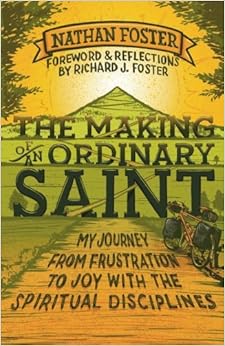The spiritual disciplines are a curious thing to me. I have read numerous books about them over the years, but I have never been quite sure what to do with them. The message that I seem to hear from the conservative side of evangelicalism with which I would align myself would suggest that spiritual disciplines can be a dangerous business if improperly understood. And yet, I have read many books about them. When I saw
The Making of An Ordinary Saint: My Journey from Frustration to Joy with the Spiritual Disciplines (2014) by Nathan Foster, I was intrigued. Certainly, as a "Foster", the child of author Richard Foster, he has a regal lineage. Honestly, though, the book cover was just as inviting and a wise choice by the publisher.
In the book, Foster set out to explore twelve spiritual disciplines--those initially described by his father in the
Celebration of Discipline--stitched to his everyday life. This approach allowed for an honest, autobiographical description of the spiritual disciplines in his life. Foster shared his challenges and new understandings in an engaging way.
As I read the book, I was deeply affected by some of his chapters, but with others, I was less engaged. The chapter on submission was my favorite. I could find myself easily connecting with what he was saying about some of the frustrations he experienced, but was drawn to his description of an Eskimo man who didn't fit the mold of the bike racers he was with. I also learned from the other chapters as well.
One of the criticisms that Foster anticipated was hearing from fundamentalists...like me, I suppose. On page 143, he wrote "While I try to remain teachable and open to the insights of others, I'm finding I have little interest in learning from extreme fundamentalists whose lives and careers are based on criticizing others--you know, those people who call themselves Christians but seem to know nothing of love." I wonder if Foster cuts himself short. I share a concern for a lack of love, but I also share a concern for truth. There is an old proverb that says, "don't become so open minded that your brains fall out." I wonder if Foster's unwillingness to learn from those whom he considers unloving is actually an unloving thing to do.
On the whole, this is a good book and I would commend it. Foster is a captivating writer and tells his story well.
A review copy of this book was provided to me by Baker Books in exchange for this review. I was not required to submit a positive review of this book.




